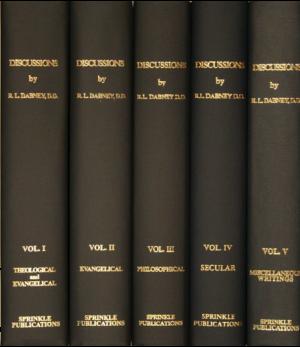
The great Southern Presbyterian theologian Robert Lewis Dabney has been mentioned a number of times on this site. It is a very telling indication of our times that such a visionary man is so little known, and usually slandered when mentioned at all. You can find the entire collection of his written works at the Dabney Archive, all of which are well worth reading. However, such a massive undertaking can be a bit overwhelming, and so on Sundays I have begun posting bite-sized excerpts from Dabney’s works with perhaps a little bit of my own commentary. This will be done in hopes of promoting wider readership for this great man. You can find links to all the previous “Dabney on Sunday” posts at the bottom of this post.
The following excerpt is taken from an article written by Dabney in 1894, entitled “Economic Effects of the Former Labor System of the Southern United States.”
He who persists in viewing and treating it [Southern slavery] as virtually the same with the system which bore the equivalent name in pagan Greece and Rome, cannot possibly understand what the Southern system really was. It may be true that “Aristotle” (Politics) “can be quoted, defining . . . a slave as . . . an animated utensil”; or that modern assailants may declare the African in the South was made by law “a mere thing,” “a chattel.” But every fair observer knows that in the South, essential changes from that unjust and harsh system were made by law, which, while for convenience sake, leaving the name of slave, made the relation to the master essentially a different one. So far did the laws of the South go from treating the African in bondage as a mere thing, owned by the master absolutely; those laws treated the bondsman as a responsible moral agent, personally amenable to statute laws, and encouraged and warned by its sanctions: they protected his life, limbs, Sabbath and chastity, against violence even from his own master: and that by the same statutes, and the same penalties which protected these rights of white persons: they gave to the bondman a legal title, as against his own master’s estate, and even against his master’s personal earnings or professional salary, to a laboring man’s subsistence for life: they enabled him, if not legally held in constraint, to sue his own master at the law, for his liberty. What then remained to the master, of the prerogatives of a master? This only: Property in the involuntary labor of the African, for life, subject to the bondsman’s right of subsistence, and such control of his person and services only as was necessary to possess that title. . . .
So, Sir William Blackstone defined the bondage which existed in his day (notwithstanding Lord Mansfield’s famous decision in the Somerset case), by law in England and all her colonies, as a title to another person’s involuntary labor, which, while a title for life, was no more in its nature, than that of the master to the labor of his indentured apprentice. So Dr. Paley, in his moral and political philosophy. We have nothing to do then, with discussing the economic results of a pagan system of slavery, never known for a moment in civilized America, which dehumanized the rational human agent into a “thing,” a mere “chattel.” The system we have to examine was as a labor system; the subjection of the labor, for life, of a certain alien and savage population defined by the law, irrespective of their optional consent, to the heads of white, free families, in a domestic government of the master; but under the limits and restraints of civil law. What were the economic results of this vigorous expedient, to which the Southern States resorted in order to protect themselves from the evils of the presence of this savage population? A presence which had not been elected by those States, but forced on them, while colonies, against their choice, by the slave trading laws of England and New England. Let the reader observe in passing that nothing more is needed than this correct definition of the relation, to make an end of the boastful argument of the Abolitionist. He argues that the relation was always and essentially wicked. The only premise which can furnish even a pretence for this conclusion is the following: That any human being’s property in the involuntary labor of another human must be always and essentially wicked. But when this is dragged into the light, its falsehood at once appears both monstrous and ridiculous. The parental relation clothes the parent with property in the involuntary labor of the child. The business relation clothes the employer with property in the involuntary labor of the apprentice. The marital relation may clothe the wife with property in the involuntary labor of the husband. There is not a legitimate government on earth that does not clothe the rulers with property in the involuntary labor of the citizens. What else is the right to tax, to exact military service? Thus this heady argument, which has incited to a frightful civil war, to the murder of a million of men and to the final destruction of a free constitution, is found to be nothing but the blind pressing of a false issue. The evil thing which Abolitionism professed to attack had no existence except in its own slanderous accusations.
Previous Dabney on Sundays:
Universal Suffrage
Abstractions
Redefining Terms
False Philosophies
Abolishing Religion
Cruelty of Humanitarian Philanthropy
| Tweet |
|
|
|




